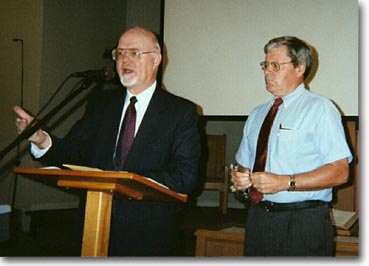A Splintering or a Strengthening?
Mennonites have had a reputation for dividing. It requires a catalog to list all the bodies and branches that consider themselves to be Mennonites or one kind or another. Groups seem to have splintered over what sometimes appears to be insignificant or trivial matters. Leaders were perceived to become defensive over nonessentials and accused of going their separate ways over personal preferences or personality differences. Where these causes divided the Body of Christ or prevented the fellowship of true believers we would agree the outcome was regrettable or even tragic.

Is the Alliance of Mennonite Evangelical Congregations one more splintering over personality conflicts, or "pickiness" over insignificant definitions, or a stubborn refusal to face the realities of changing times? We think not! And we are convinced none of these were our desire or motivation. Indeed, we are disappointed that there may be many who share our convictions about biblical truth and our desires concerning a consistent witness to carry out the mission of the church, but who are being led to believe our reasons are suspect and our motives are questionable. We welcome questions to gain clarification; we are willing to explain the reasons for our conclusions. But for those who are suspicious of our motivations, we can only request that sufficient time be granted for the validity of our choices to be confirmed.
New branches on the vine are not proof of more splintering. Pruning and grafting may appear confusing to a bystander, but the connection to the life-giving vine and the resulting fruitfulness of the branch is adequate justification for additional branches. Separation is sometimes necessary for healthy strengthening. Seeking purity through accuracy and clarity is not being persnickety but obedient. Freedom to flourish in fruitfulness is different from selfish seeking of autonomy. It is not more splintering but a stronger church that we seek, strong in conviction, strong in commitment, strong in connections. Those connections are in Christ, not in ethnic or cultural affinities. That commitment must be to the unchanging person and work of Jesus Christ as Savior and Lord, the eternal God the Son, and the calling to which He calls us. The only conviction on which to build a faith, a future and a fellowship must grow out of an absolute, God-given authority which we are convinced is what He has given us, the Bible.
Page 1 Page 2 Page 3 Page 4


